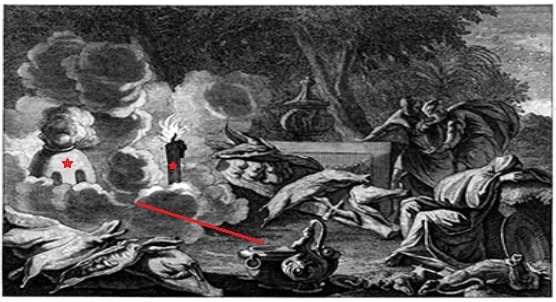Covenant Definition

understanding of the character of God and the Gospel.
A covenant definition or illustration I like to use is that of a landowner agreeing to pay money to a contractor to build a house. The contractor agrees to build the house using specifications provided by the landowner in exchange for the money. The house is the subject of the covenant but it is not the covenant itself. The covenant is the agreement of each party to do their part.
Traditional Legal Model – The covenant (the agreement) is sometimes confused with the subject of the agreement often thought of as the law of Ten Commandments and the thinking is that the Old Covenant concerns the Ten Commandments and was replaced by the New Covenant since the law was (mistakenly thought to have been) done away.
Biblical Healing Model – The covenant we are most concerned with is God’s promises to man. Essentially, using the illustration above, God, the Master Architect, proposes to build a house for us, with our cooperation.
This study does not get into the distinction often made between covenants of law and grace separated by time and equated to the Old and New Testaments or before and after the cross. See the page defining dispensations for an explanation that the dispensations are not in historical time but individual experience in the life of each person.
Covenant Definition – God’s Covenant
Rather, this study looks at the Abrahamic covenant in order to understand the meaning of God’s covenant.
Promises were first made to Abraham in Genesis chapter 12:
“Now the LORD had said unto Abram, Get thee out of thy country, and from thy kindred, and from thy father’s house, unto a land that I will shew thee: 2 And I will make of thee a great nation, and I will bless thee, and make thy name great; and thou shalt be a blessing: … And the LORD appeared unto Abram, and said, Unto thy seed will I give this land: and there builded he an altar unto the LORD, who appeared unto him.” (Gen 12:1-2, 7)
As he had no offspring, Abraham looked for some assurance that God’s promise would be fulfilled to him:
“And he said, Lord GOD, whereby shall I know that I shall inherit it?” (Gen 15:8)
Covenant Definition – An Accommodation
God sought to assure him and, of course, would have to do it in a way that would actually give assurance to Abraham. And so, God, using a form of establishing agreements or covenants that Abraham was familiar with (because that was within the culture of his day), directed Abraham:
“And he said unto him, Take me an heifer of three years old, and a she goat of three years old, and a ram of three years old, and a turtledove, and a young pigeon. And he took unto him all these, and divided them in the midst, and laid each piece one against another: but the birds divided he not.” (Gen 15:9-10)
Hebrew teacher Jeff Benner explains the ancient middle-eastern ritual of making a covenant:
“A covenant was instituted by the two parties of the covenant who would take a fattened animal, the best of the flock or herd, and “cut” it into two pieces. Then the two parties of the covenant would pass through the pieces symbolizing their dedication to the covenant and by this action are saying, “If I do not hold to the agreements of this covenant, you can do to me what we did to this animal.” This methodology of “making” a covenant is clearly recorded in Jeremiah 34:18-20.” (Jeff Benner: https://www.ancient-hebrew.org/studies-interpretation/covenants-from-a-hebrew-perspective.htm)
Here is an artist’s portrayal of the scene:

The smoking furnace, burning lamp and their path
through the severed animals is added.
What God was doing in this scene with the animal parts was an accommodation to Abraham’s doubts regarding His promises by using a form of covenant making that Abraham was familiar with. It was never God’s desire to sacrifice animals for confirming covenants or for any other reason.
“Sacrifice and offering thou didst not desire; mine ears hast thou opened: burnt offering and sin offering hast thou not required.” (Psa 40:6)
Covenant Definition – Making the Covenant
In keeping with Abraham’s understanding of the custom, Abraham would have passed between the animal parts. And then:
“And it came to pass, that, when the sun went down, and it was dark, behold a smoking furnace, and a burning lamp that passed between those pieces.” (Gen 15:17)
There are various ways to understand these symbols.
One is that it was a smoking furnace (representing God, veiled in smoke, not visible to human eyes) and a burning lamp (representing God’s Son, the visible representative of His Father).
Another is related to the experience of Abraham’s descendants which had certainly been mentioned (“Unto thy seed” – Gen 12:7); descendants who spent many years in slavery.
“Which I commanded your fathers in the day that I brought them forth out of the land of Egypt, from the iron furnace, saying, Obey my voice, and do them, according to all which I command you: so shall ye be my people, and I will be your God:” (Jer 11:4) (see also Deut 4:20, 1 Kings 8:51 and Isa 48:10)
When they were brought forth from that furnace of affliction, it was the Divine presence in the pillar of fire that guided them:
“And the LORD went before them by day in a pillar of a cloud, to lead them the way; and by night in a pillar of fire, to give them light; to go by day and night:” (Exo 13:21)
“In the same day the LORD made a covenant with Abram, saying, Unto thy seed have I given this land, from the river of Egypt unto the great river, the river Euphrates:” (Gen 15:18)
The furnace of affliction and burning lamp or pillar of fire are mentioned.
A Covenant Starts With Belief or Trust
“And the scripture was fulfilled which saith, Abraham believed God, and it was imputed unto him for righteousness: and he was called the Friend of God.” (James 2:23) (See also Rom 4:3, 22; Gal 3:6)
Righteousness will be reflected in behavior, in right doing:
“And it shall be our righteousness, if we observe to do all these commandments before the LORD our God, as he hath commanded us.” (Deut 6:25)
“By faith Abraham, when he was called to go out into a place which he should after receive for an inheritance, obeyed; and he went out, not knowing whither he went.” (Heb 11:8)
Because that Abraham obeyed, GOD was able to bless him.
“And I will make thy seed to multiply as the stars of heaven, and will give unto thy seed all these countries; and in thy seed shall all the nations of the earth be blessed; Because that Abraham obeyed my voice, and kept my charge, my commandments, my statutes, and my laws.” (Gen 26:4-5)
“And in thy seed shall all the nations of the earth be blessed; because thou hast obeyed my voice.” (Gen 22:18)
Abraham was righteous (or right with God) because of his belief and blessed because of his obedience – God’s laws (which Abraham obeyed) are all designed with blessings built in to them as a natural result.
“And he believed in the LORD; and he counted it to him for righteousness.” (Gen 15:6)
Abraham had faith, he trusted God enough to obey and received the blessings (with more to come).
![]()
The process above (but without the cultural ritual) will apply to us as we enter into a covenant relationship with God.
Covenants – a Deeper Meaning
The house commissioned by the land owner in my opening example will reflect his tastes, desires and values and have the features he wants. The “house(s)” or “mansions” God is building for us will be according to His design – He knows best what will make us happy. We might think that our heavenly mansion will have the perfect interior design to please us. But perhaps it goes beyond that.
Consider these verses:
“To whom coming, as unto a living stone, disallowed indeed of men, but chosen of God, and precious, Ye also, as lively stones, are built up a spiritual house, an holy priesthood, to offer up spiritual sacrifices, acceptable to God by Jesus Christ.” (1 Pet 2:4-5)
“In whom ye also are builded together for an habitation of God through the Spirit.” (Eph 2:22)
God speaks of us being a spiritual house, (a habitation for God). Ultimately, what God is promising, the final product of the covenant, is Christ-like characters in His children. So, in a sense, we are the mansions and the interior design (our characters) is very important.
“For this is the covenant that I will make with the house of Israel after those days, saith the Lord; I will put my laws into their mind, and write them in their hearts: and I will be to them a God, and they shall be to me a people:” (Heb 8:10)
He says He will put His laws in our minds and hearts but that is not something that is forced upon us – He always respects our free will. Rather, it is the natural result of our beholding what He is like:
“But we all, with open face beholding as in a glass the glory of the Lord, are changed into the same image from glory to glory, even as by the Spirit of the Lord.” (2 Cor 3:18)
We look to Him, specifically and especially to Jesus’ self-sacrificing love as displayed on the cross, with the result that we are drawn to Him:
“And I, if I be lifted up from the earth, will draw all men unto me.” (John 12:32)
That will affect our thinking, renew our minds like the mind of Christ and, of course, influence our behavior. The change (remodeling, writing His law of love in our hearts etc) that will result makes us suitable dwelling places for Him via His Spirit and this, ultimately, is the goal of His covenant promise to us.
“… as God hath said, I will dwell in them, and walk in them; and I will be their God, and they shall be my people.” (2 Cor 6:16)
See a video of a group study on the Biblical meaning of Covenant.
Return to the Character of God and the Gospel Glossary Index
Return to the Home Page
